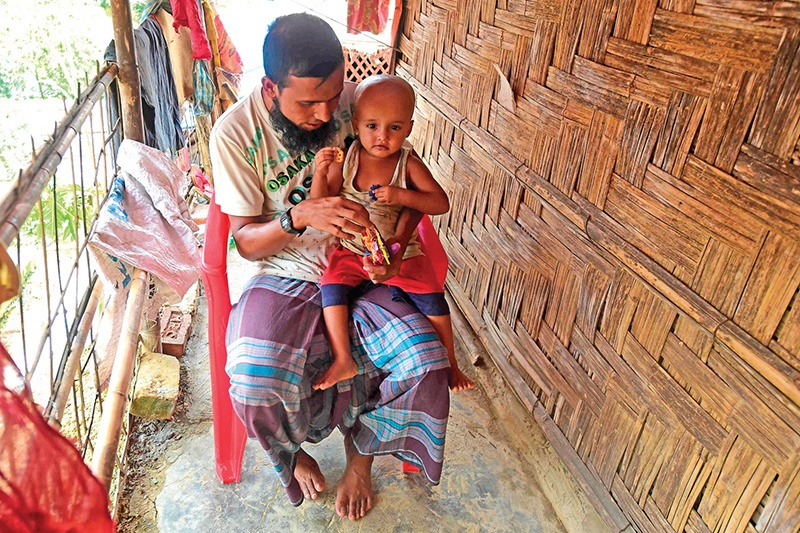

BALUKHALI:Heavily pregnant Rohingya mother Rashida Khatun fled her home in a remotevillage in Myanmar's Rakhine state two years ago, bone-tired but desperate tofind a safe place to give birth. After walking for hours with her husband andthree children, Khatun took a treacherous sea journey in bad weather to reachthe southeastern tip of Bangladesh.
The family tookshelter beside a road and erected a makeshift roof with twigs and a polythene sheet.Several hours later, Khatun gave birth to Ahmad Shah in the pouring rain,helped by other Rohingya women also sheltering nearby. "I was so tired.Yet I wanted to give a safe birth to my unborn baby," the 29-year-oldmother said.
"I thoughthe wouldn't survive because we were getting drenched by the rain." Shahturned two on Sunday-the second anniversary of the mass exodus of some 740,000Rohingya who fled a brutal military crackdown in western Myanmar and tookrefuge in vast, squalid camps in Bangladesh. His birth, and his family'sordeal, are a reminder of the struggles the stateless Muslim minority wentthrough to flee their homeland.
Some 200,000Rohingya took part in a rally at the world's largest refugee settlement onSunday to mark what the refugees describe as "Genocide Day". Shah'sfather Mohammad Selim said his son was a miracle child. "Allah saved mykid that night. All praise to Him," said Selim, an imam at a mosque atBalukhali refugee camp. He said his other children still remembered the traumaof the perilous journey. "I am so happy for Shah that he didn't have to gothrough those woes. I will make him an Islamic scholar someday," he added.
Rohingya shotdead
In anotherdevelopment, Bangladesh police shot dead a third Rohingya refugee yesterdayafter they were accused of the murder of a ruling party official that hassparked anger among the local population. Nearly a million Rohingya live insqualid camps in south-east Bangladesh, 740,000 of whom fled a 2017 militaryoffensive against the Muslim minority in Myanmar.
Police saidMohammad Hasan, a suspected Rohingya "dacoit" or gang member, wasshot dead after he allegedly opened fire at officers during a raid to arresthim at Jadimura refugee camp. "He is an accused in the murder of OmarFaruk," local police chief Prodeep Kumar Das told AFP, referring to aruling Awami League party youth wing official who was shot in the head bysuspected Rohingya criminals on Thursday.
On Saturdaypolice said they had shot dead two Rohingya refugees at the same refugee campin the Cox's Bazar district over their alleged roles in the murder. Rightsactivists, who asked not to be named, said they believe the two Rohingya menwere killed by police in what appeared to be a staged encounter. The incidentcomes days after a second failed attempt to repatriate the refugees which sawnot a single Rohingya turn up to return across the border to conflict-scarredRakhine state.
On Sunday, theRohingya marked two years since the military crackdown in Myanmar with some200,000 rallying in a refugee camp where refugee leaders vowed they won'treturn home unless their rights and security are ensured. Faruk's murder hadsparked anger among the local population, with hundreds of furious peopleblocking a key highway leading to the camp for hours on Thursday, burning tyresand vandalizing shops visited by refugees.
Rohingya refugeeshave said the recent bloodshed has created an atmosphere of fear in the camp,where security has been tightened. With the latest death, at least 33 Rohingyahave been killed by Bangladeshi police and security forces since the exodus inAugust 2017, a police inspector Ruhul Amin said. He said that most weresuspected drug traffickers, accused of smuggling yaba, a popular methamphetaminepill from across the Myanmar border. UN investigators have said the 2017violence warrants the prosecution of top Myanmar generals for"genocide". - Agencies

